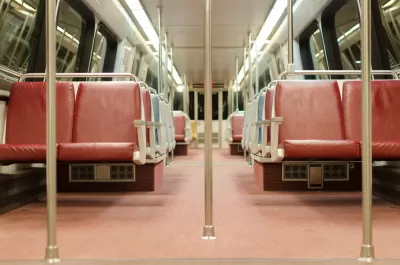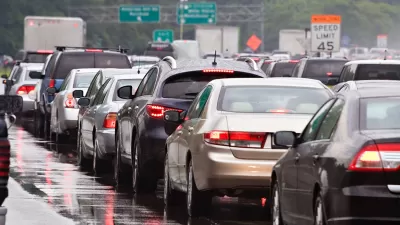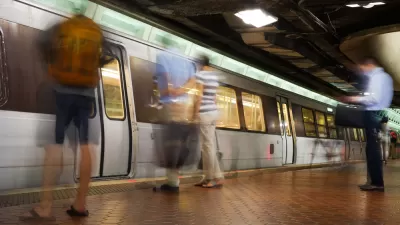The news from the most recent American Community Survey data isn't entirely bad for advocates hoping that Americans will switch to more efficient, less impactful forms of commuting.

Romic Aevaz shares analysis of one-year estimates of commutes from the 2018 American Community Survey, reporting increasing teleworking and declining in driving alone.
"Data from the newly released 2018 American Community Survey shows that telework continued its upward trend, while driving alone to work trended slightly downward. Several regions that had a reduction in the share of workers driving alone had a corresponding increase in biking and walking to work.'
According to Aevaz, working from home has surpassed public transit commuting for the second year in a row. Really, driving alone is mostly the same, having declined only slightly from 76.4 percent mode share nationally in 2017 to 76.3 percent in 2018. The figure has declined from 76.5 percent in 2014. Public transit commutes have declined from 5.2 percent in 2014 to 4.9 percent in 2018, according to the data.
There is a lot more nuance available at the regional level, as detailed by tables created for the article. Aevaz explains the big takeaways from regional data thusly:
Of the 15 regions profiled, the share of workers driving alone decreased in the past year in 10 of the regions and 9 of the core cities. The most substantial drops were in Seattle (-2.8% in the city, -1.5% regionally), San Francisco proper (-2.1%), Detroit (-2% in the city, -1.1% in the region), Philadelphia proper (-1.5%), and San Diego proper (-1.5%). The most substantial increase was in Houston (1.2% in the city, 0.6% in the region). In a few cities, the share of commuters driving alone to work moved noticeably in opposite directions in the city proper and broader region. In Atlanta and San Francisco, the share of workers driving alone dropped in the city limits (almost 1 point in Atlanta, two points in San Francisco) but increased in the region as a whole.
There are a lot more details in the article, as well as a promise of five-year data to come in December.

Maui's Vacation Rental Debate Turns Ugly
Verbal attacks, misinformation campaigns and fistfights plague a high-stakes debate to convert thousands of vacation rentals into long-term housing.

Planetizen Federal Action Tracker
A weekly monitor of how Trump’s orders and actions are impacting planners and planning in America.

In Urban Planning, AI Prompting Could be the New Design Thinking
Creativity has long been key to great urban design. What if we see AI as our new creative partner?

King County Supportive Housing Program Offers Hope for Unhoused Residents
The county is taking a ‘Housing First’ approach that prioritizes getting people into housing, then offering wraparound supportive services.

Researchers Use AI to Get Clearer Picture of US Housing
Analysts are using artificial intelligence to supercharge their research by allowing them to comb through data faster. Though these AI tools can be error prone, they save time and housing researchers are optimistic about the future.

Making Shared Micromobility More Inclusive
Cities and shared mobility system operators can do more to include people with disabilities in planning and operations, per a new report.
Urban Design for Planners 1: Software Tools
This six-course series explores essential urban design concepts using open source software and equips planners with the tools they need to participate fully in the urban design process.
Planning for Universal Design
Learn the tools for implementing Universal Design in planning regulations.
planning NEXT
Appalachian Highlands Housing Partners
Mpact (founded as Rail~Volution)
City of Camden Redevelopment Agency
City of Astoria
City of Portland
City of Laramie





























